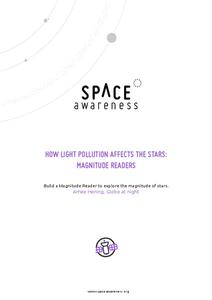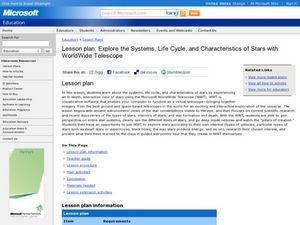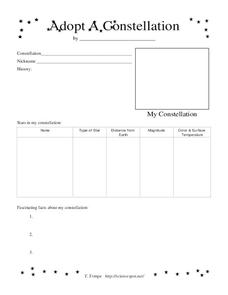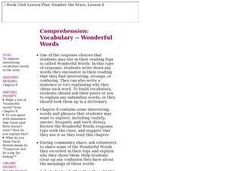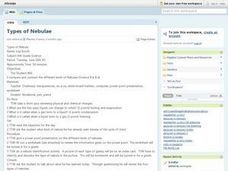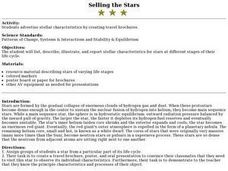Curated OER
Stars and Slopes
More of a math lesson than physics or space science, high schoolers take a set of data and plot it on a log-log coordinate system. The write-up for day two was never completed, but day one, "Stars and Slopes," is complex and cohesive....
University of Texas
Lives of Stars
Stars exist from a few million years to over 10 billion years, depending on their mass. Scholars perform a play acting as stars to learn about their different life cycles. They develop an understanding of many of the fundamental concepts...
Curated OER
Exploring Stars
Students discuss the life of a star and the different types of stars after watching the Discovery video "Exploring Stars". They create a flipbook that demonstrates the life of a star after collecting information on the life cycles of...
Curated OER
Star Count
Fourth graders explore the night sky with their star counter. They to determine the types of stars and the number that can be seen from their local area and share their data via the Internet. They participate in NASA online projects.
Star Wars in the Classroom
"Shakespeare and Star Wars": Lesson Plan Day 1
"Now is the summer of our happiness/Made winter by this sudden, fierce attack!" Luke Skywalker meets Hamlet in a 10-instructional activity unit based on Ian Doescher's William Shakespeare's Star Wars: Verily, a New Hope. Using Star...
Space Awareness
Star in a Box
What happens to stars as they get older? A simulation takes pupils through the life cycle of stars based on their masses. The resource introduces the Hertzsprung-Russell diagram and the common relationships and life cycle patterns observed.
Space Awareness
How Light Pollution Affects the Stars: Magnitude Readers
Did you know light can decrease visibility? Light pollution absolutely makes it more difficult to see stars. Scholars build a simple magnitude reader to determine the magnitude of stars. They use these data to estimate the impact of...
Space Awareness
Make a Star Lantern
Go star-gazing with young learners! They study the history, origins, and patterns of constellations in an activity that explores the starry night sky.
Curated OER
Explore the Characteristics of Stars with Microsoft WorldWide Telescope
Students explore the characteristics of stars. In this space science activity, students use the Microsoft WorldWide Telescope program to identify the properties of stars and identify the stars in the galaxy.
University of Colorado
Star Light, Star Bright? Finding Remote Atmospheres
People might be able to breath there. Learners view a simulation of a planet passing in front of a star. Using data from occultations of planets with known types of atmospheres, scholars determine whether the simulated planet has an...
Curated OER
The Battle for Ultimate Power
Students gain an understanding of how the powers of 10 and scientific notation can be used to represent the scale of things in the universe. They relate the number of stars in the universe to the number of grains of sand on Earth's beaches.
Curated OER
Comets, Stars, the Moon, and Mars
Learners read the book Comets, Stars, the Moon, and Mars about space. In this space lesson plan, students make their own poetry book about space.
Curated OER
Adopt a Constellation
Students adopt a constellation and find detailed information about their constellation. In this constellation lesson plan, students use the web to find information about a constellation of their choice. They identify the history of the...
Curated OER
Comprehension: Vocabulary - Wonderful Words
While reading Chapter 8 of Number the Stars, learners write down any words they encounter in their reading that they find interesting, strange, or confusing. They record why they chose each word, and after completing the reading...
Curated OER
Types Of Nebulae
Eighth graders explore the different types of nebulae that can be found in the solar system. They view a PowerPoint presentation about the material and identify each nebulae as it is presented. Students also discuss the life cycle of a...
Curated OER
The Spectrum of a Star
Tenth graders identify stars based on their line spectra. In this astronomy lesson, 10th graders analyze spectrograph and determine the elements present in the star. They explain the relationship between temperature and star classes.
Curated OER
Exploring Stars
Fifth graders explore the life cycle of stars. They analyze small, medium, and large stars and view a video that compares the life cycles of the various sized stars. They create a flipbook movie detailing the life cycles of a star and...
Curated OER
Unit 2 Sun & Stars
Young scholars describe stellar objects using terms such as stars, planets, satellites, orbits and light. For this sun and stars unit, students research stellar objects through seven individual lessons discovering star characteristics,...
Space Awareness
What is a Constellation
Why do some stars in a constellation appear brighter than others? Using a get-up-and-move astronomy activity, scholars explore perspective and the appearance of constellations in the sky while developing an understanding of the...
Curated OER
Selling the Stars
Students create a travel brochure, poster, and presentation to encourage others to visit a star. For this stellar characteristics lesson, students research a star type based on its life-cycle. They create a travel campaign to convince...
Curated OER
Star Light, Star Bright : Exploring How Stars Are Classified
Young scholars work in small groups to organize stars into different categories. They consider size, luminosity, color and temperature, organize the groups and ten report their categories to the class.
Curated OER
Determining Red-Shift in a Receding Star
Students practice manipulating algebra formulas with more than one variable. They examine the topics of velocity, wavelength and frequency. They determine the amount of red-shift in a receding star.
Curated OER
Let the North Star Tell You Where You Are
Students create an astrolabe and locate the North Star in the night sky. They determine the latitude of the North Star, and calculate an average latitude based on class results.
Curated OER
Types of Sentences
Fourth graders identify and write different types of sentences. In this sentences lesson plan, 4th graders use pictures and animation to write declarative, interrogative, imperative, and exclamatory sentences.
Other popular searches
- Different Types of Stars
- Differant Types of Stars
- Types of Stars Universe
- Types of Stars 3d
- Differ Ant Types of Stars






